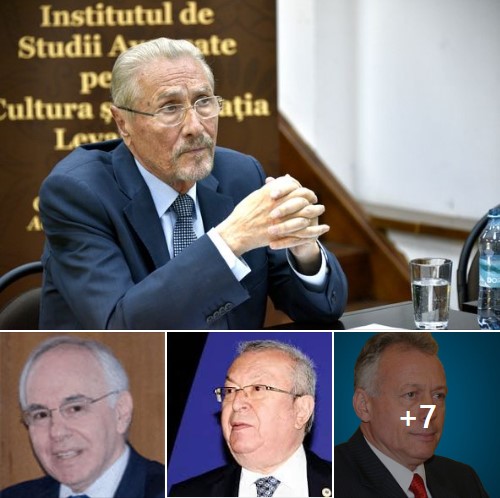Dr. Akkan Suver spoke at the Romanian Levant Institutes conference on the World After Pandemic
Speaking at the International Conference (Lessons of the Pandemic) organized by ISACCL (The Institute for Advanced Studies in Levant and Civilization), headquartered in Bucharest, Dr. Akkan Suver talked about the world after the pandemic and the work carried out by the Marmara Group Foundation during the pandemic. World famous personalities took the floor in the successful meeting of ISACCL, which was also a partner of the Marmara Group Foundation and chaired by the President of Romania (1996-2000) H.E. Prof. Dr. Emil Constantinescu.
Below you will find the speech of Dr. Akkan Suver:
First of all, I wish all the participants healthy days.
In these last days of 2020, due to the Coronavirus pandemic that we have been living for ten months and will continue to live for a while, I greet with respect the Levant Institute and in their person H.E. Emil Constantinescu and his friends who gathering us in order to share our thoughts about tomorrow.
We are having a hard time.
At the end of these difficult days, we will meet a world unlike today.
What will the world be like after COVID-19? Will there be more competition or more cooperation? It is a very difficult task to seek answers to these questions in a period when the pandemic is continuing and when no one can tell when it will end. However, the first indications show that the pandemic unfortunately reinforces pre-existing competitive trends in international relations. Before the emergence of COVID-19, states, especially the wealthier ones, were highly selfish and less likely to take responsibility for global affairs. Global governance was under pressure. International organizations were struggling to stay relevant. Declining global cooperation went hand in hand with increasing nationalism and great power politics. Moving away from globalization had increased; universalism and a rule-based international order were struggling. COVID-19 highlighted and accelerated all these developments.
The extent to which the current international system is ineffective in tackling the international community's COVID-19 crisis and its social, political and economic impacts has clearly proven today. What is not clear is what to do about it. We have two alternatives: the increasing isolation that each state goes its own, or that states are reshaping international organizations and strengthened multilateralism, where they combine their means to find global solutions to global problems. As humanity, we need international organizations with high capabilities, wide resources and strong will, which can overcome global political and economic problems, as well as produce solutions to environmental, cultural and health-related problems. The pandemic made this clear. It can be a good starting point to consider institutional approaches that can lead all countries to cooperate in line with their own needs and possibilities.
After summarizing these, I would like to talk about the Marmara Group Foundation with its activities during the pandemic.
As the Marmara Group Foundation, despite the new type of coronavirus (Covid-19) we are experiencing, we blazed a trail and successfully held the 23rd Eurasian Economic Summit in the digital environment via satellite.
Despite this pandemic environment, 69,653 people watched the 23rd Eurasian Economic Summit in geography from South Africa to the People's Republic of China, from Mongolia to the United States, from Tunisia to Kyrgyzstan.
At the 23rd Eurasian Economic Summit, which was attended by the audience from time to time and asked questions from time to time, there were visionary opinions about the future as well as daily comments. President of Sinovac Vaccine Research Center, Helen Yang gave the latest information about the Covid-19 vaccine, while American, French, Russian, and Georgian researchers and Turkish and Azerbaijani MPs brought up the events in Karabakh.
As Marmara Group Foundation, we are a pioneer in civil society activities in Turkey.
In the Covid-19 pandemic process, we conducted a study called Corona Days whose subject is “What kind of world will it be tomorrow?". 66 thinkers including His Excellency Emil Constantinescu from 23 countries participated in this study by writing an article.
Again in this pandemic period, the Grand National Assembly of Turkey realized the 100th Age of Honor. By doing an exceptional study on this subject we published a book consisting of the articles of former and current Chairmen of the Turkish Grand National Assembly, deputies, and thinkers and that shed light on history.
In this successful working environment, we have prepared a book to commemorate the 9th President of Turkey Süleyman Demirel who has an important share in the establishment and development of the Marmara Group Foundation.
In the book, we gathered the memories of the presidents and his political friends who knew Süleyman Demirel, including His Excellency Emil Constantinescu, President of Azerbaijan Ilham Aliyev, and President of Kazakhstan Nursultan Nazarbayev.
Marmara Group Foundation EU and Human Rights Platform successfully completed another EU Project during the pandemic period. Marmara Group Foundation, which concluded the project titled Turkish Youth and Women for Democracy in 19 months due to the pandemic, first completed its work and activities in Istanbul, Ankara, and Berlin. After the pandemic, the workshops held digitally over the webinar came to an end with hybrid events.


